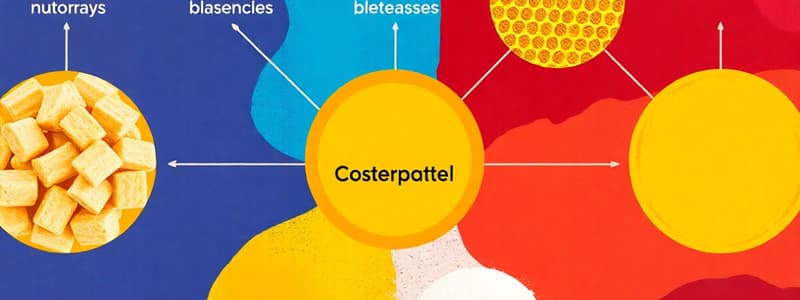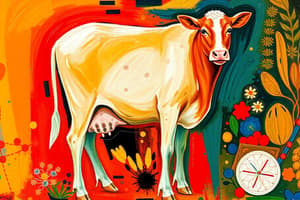Podcast
Questions and Answers
What type of acid is predominantly produced in high starch diets?
What type of acid is predominantly produced in high starch diets?
- Propionic acid (correct)
- Acetic acid
- Lactic acid
- Butyric acid
Which statement about lignin is correct?
Which statement about lignin is correct?
- Lignin is easily digestible by microbial enzymes.
- Lignin content decreases as a plant matures.
- Lignin increases nutrient availability in feedstuffs.
- Lignin is a polyphenolic polymer. (correct)
What is the primary greenhouse gas produced from ruminant digestion?
What is the primary greenhouse gas produced from ruminant digestion?
- Nitrous oxide
- Carbon dioxide
- Ozone
- Methane (correct)
Which factor does NOT affect microbial digestion of crude fiber?
Which factor does NOT affect microbial digestion of crude fiber?
How much methane is typically produced from the digestion of 100 grams of carbohydrates?
How much methane is typically produced from the digestion of 100 grams of carbohydrates?
What impact does grinding roughages have on their digestibility?
What impact does grinding roughages have on their digestibility?
Which of the following is a means to lower methane production in ruminants?
Which of the following is a means to lower methane production in ruminants?
Which of the following trace elements is specifically mentioned as needed by microorganisms?
Which of the following trace elements is specifically mentioned as needed by microorganisms?
What are carbohydrates primarily composed of?
What are carbohydrates primarily composed of?
Which of the following is a disaccharide?
Which of the following is a disaccharide?
What distinguishes starch from cellulose in terms of molecular linkages?
What distinguishes starch from cellulose in terms of molecular linkages?
Which carbohydrate source is predominantly utilized by horses?
Which carbohydrate source is predominantly utilized by horses?
What is the primary site of carbohydrate digestion in ruminants?
What is the primary site of carbohydrate digestion in ruminants?
What are the primary end products of rumen fermentation of carbohydrates?
What are the primary end products of rumen fermentation of carbohydrates?
Which of the following statements regarding carbohydrate digestion is true for monogastrics?
Which of the following statements regarding carbohydrate digestion is true for monogastrics?
Which short-chain fatty acid is NOT a primary product of carbohydrate fermentation in ruminants?
Which short-chain fatty acid is NOT a primary product of carbohydrate fermentation in ruminants?
Flashcards are hidden until you start studying
Study Notes
Carbohydrates in Animal Nutrition
- Carbohydrates are composed of carbon, hydrogen, and oxygen.
- Carbohydrates are the primary dietary energy source for animals.
- The simplest form of carbohydrates is a monosaccharide.
- Monosaccharides include glucose, fructose, and galactose.
- Two monosaccharides linked together form a disaccharide, including sucrose and lactose.
- Polysaccharides are composed of three or more monosaccharides.
- The two primary polysaccharides are starch and cellulose.
- Starch is composed of glucose molecules linked via alpha linkages.
- Alpha linkages can be broken down by both mammalian and microbial enzymes.
- Cellulose is composed of glucose molecules linked via beta linkages.
- Beta linkages can only be broken down by microbial enzymes.
- Grains are high in starch.
- Forages are high in cellulose.
- Other carbohydrates include pectins and hemicellulose.
- Pectins and hemicellulose are only digested and utilized by microbes.
Carbohydrate Digestion in Monogastrics and Ruminants
- Monogastrics primarily digest starch in the small intestine using pancreatic amylase and other enzymes.
- Monosaccharides are absorbed into the bloodstream via the small intestine.
- Some monogastrics, like horses, can utilize forage due to their microbial population.
- Horses have the highest efficiency in utilizing fibrous compounds among monogastrics.
- Ruminants primarily digest carbohydrates in the reticulorumen.
- Dietary carbohydrates are initially subjected to rumen microbial digestion.
- Rumen microbes digest sugars, starch, hemicellulose, and cellulose.
Rumen Fermentation and Volatile Fatty Acids
- The end products of carbohydrate digestion in ruminants are volatile fatty acids (VFAs) and some monosaccharides.
- The primary VFAs are acetic acid, propionic acid, and butyric acid.
- VFAs are absorbed across the rumen or small intestine and metabolized for energy production.
- High starch diets result in higher propionic acid production.
- High fiber diets result in higher acetic acid production.
- Intestinal digestion of carbohydrates is limited in mature ruminants.
Lignin
- Lignin is a polyphenolic polymer.
- Lignin is found in fibrous feedstuffs.
- Lignin is indigestible by both microbial and mammalian enzymes.
- Lignin decreases the digestibility and availability of other nutrients in the feed.
- Lignin content increases as plants mature.
Gas Production in the Rumen
- Methane (CH4) is a major component of rumen gas and a greenhouse gas.
- Rumen gas typically consists of 40% CO2, 30-40% methane, 5% H2, and small amounts of O2 and nitrogen.
- Approximately 4.5g of methane is produced from every 100g of carbohydrate digested, representing a 7% loss of food energy.
Reducing Methane Production
- Adding unsaturated fatty acids to the diet can reduce methane production.
- Unsaturated fatty acids are saturated by microorganisms, requiring hydrogen in the process.
- This process reduces the amount of methane formed in the rumen.
Factors Influencing Microbial Digestion of Crude Fiber
Animal Factors
- Species: Different species have different rumen microbial populations.
- Age: Young animals have less developed rumen microbial populations.
- Ruminal Environment: Factors like pH and the presence of antibiotics can affect microbial activity.
- Health Status: Ill animals may have reduced rumen microbial activity.
Plant Factors
- Age of the Plant: Younger plants have lower lignin content and are more digestible.
- Type of Roughage: Different roughages have varying digestibility.
Ration Composition
- Starch and Soluble Carbohydrates: High levels can increase rumen acidity and impact microbial activity.
- Dietary Protein: Adequate protein is needed for microbial growth.
- Minerals and Vitamins: Trace elements like cobalt are essential for microbial function.
Feed Preparation
- Alkali Treatment: Can increase the degradability of crude fiber.
- Grinding: Can reduce crude fiber digestibility.
- Pelleting: Can decrease crude fiber digestion due to increased rate of passage.
Studying That Suits You
Use AI to generate personalized quizzes and flashcards to suit your learning preferences.




